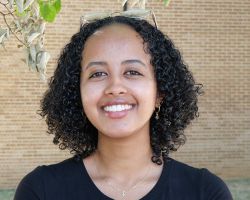Student: Fenet Demissie
Project: Spatiotemporal Presentation of Bioactive Peptides in 3D-Printed Scaffolds
Poster: Horizontal (PDF) | Vertical (PDF)
Institution: Lehigh University
Major: IDEAS / Bioengineering
Advisor: Lesley Chow
Abstract
Osteoarthritis is a debilitating disease characterized by progressive osteochondral (bone-cartilage) tissue degeneration in articulating joints. Growth factors (GFs) like transforming growth factor β-1 (TGF-β1) and bone morphogenetic protein-2 (BMP-2) are commonly used to enhance osteochondral tissue regeneration. However, GFs have short half-lives and typically need to be used at high concentrations, increasing their cost and potential for adverse side effects. Our lab is using the more stable GF-mimetic peptides as a promising, low-cost alternative to whole GFs, which can be designed for well-defined spatial and temporal delivery. LIANAK, a TGF-β1-mimetic peptide has been shown to promote chondrogenesis. We are using bioorthogonal mechanisms to control the spatiotemporal presentation of this peptide on the surface of 3D-printed poly(caprolactone) (PCL) scaffolds for stable cartilage regeneration.
We modified LIANAK with dibenzocyclooctyne (DBCO) to selectively react with an azide-functionalized 3D-printed PCL (PCL-azide) scaffold. This approach will allow us to control the spatial and temporal presentation of this TGF-β1-mimetic peptide (TGFpep) to direct local cartilage tissue formation.
To prepare azide-functionalized PCL scaffolds, azide-PCL conjugate was mixed with unmodified PCL in a hexafluoroisopropanol (HFIP), and the scaffold was solvent-cast 3D printed. The TGFpep LIANAK was synthesized using standard Fmoc solid phase peptide synthesis and modified with DBCO-COOH click chemistry moiety and rhodamine B isothiocyanate fluorophore to track peptide location within the scaffold. The DBCO-TGFpep(rhodamine) peptide was attached to the azide-PCL scaffolds and the samples were imaged using fluorescence microscopy.
Future Work: We will demonstrate that the TGFpep can be attached to the azide-PCL scaffold in the presence of cells and characterize mesenchymal stromal cell (MSC) differentiation behavior in response to the TGFpep.

About Fenet Demissie
Fenet Demissie is a third-year student at Lehigh University majoring in IDEAS* concentrating in bioengineering and biomaterials. She is interested in biomaterials research for tissue regenerative applications. Her research at the Chow Lab focuses on the use of growth factor mimetic peptides presented on 3D-printed scaffolds for osteochondral regeneration. Outside of research, Fenet is involved in mentoring first-year students through the LUSSI program and serves as the community service chair for the Lehigh University Minority Association for Premedical Students.
